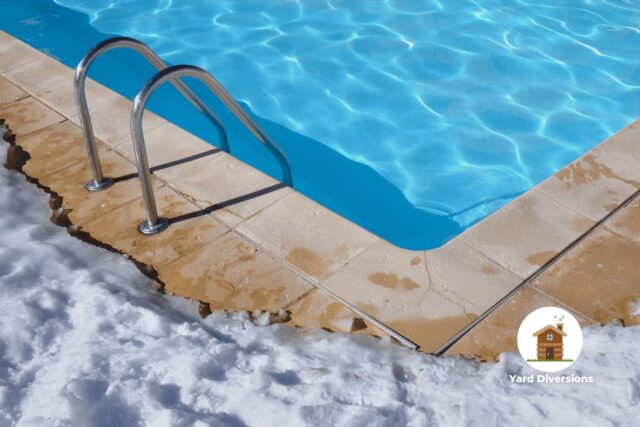Are you considering getting a saltwater pool but are worried about how it will handle freezing temperatures? Don’t worry; we’ve got you covered!
In this blog post, we’ll discuss the freezing point of saltwater pools and how to protect them from the cold.
Read on to find out more!

What is the Freezing Point of a Saltwater Pool?
When it comes to saltwater pools, the freezing point is lower than for regular chlorinated pools.
Saltwater pools typically freeze at around 28°F, whereas regular chlorinated pools will freeze at around 32°F.
This is because saltwater has a lower freezing point than regular water; the more salinity a pool has, the lower its freezing point.
Knowing this, it’s essential to check your pool’s temperature regularly to ensure it doesn’t dip below the freezing point.
If you do find that your pool’s temperature is too low, there are a few things you can do such as covering your pool, insulating your pool equipment, and using heaters and heat pumps to keep it warm.
What is the Difference Between Saltwater and Regular Chlorinated Pools?
The difference between saltwater and regular chlorinated pools is quite significant. Saltwater pools require the same chemicals as a regular chlorine pool, but no chlorine is added.
Instead, the natural electrolysis process turns the salt in the water into chlorine.
This process is gentler on the skin and eyes, and on average, a saltwater pool will contain about ten times less salt than the ocean.
Additionally, saltwater pools tend to have smoother water than a regular chlorinated pools.
The freezing point of a saltwater pool is slightly lower than that of a regular chlorinated pool, usually freezing around 28° F versus 32° F for a chlorinated pool.
Furthermore, when temperatures drop to 60 degrees or below, the salt generators in saltwater pools will shut down automatically to protect your pool from freezing.
What Should I Do If My Pool Temperature Falls Below Freezing?
When temperatures drop below freezing, the water in a saltwater pool can start to freeze, leading to costly freeze damage.
To prevent this from happening, it’s essential to keep your pool pump running continuously while the temperature is below freezing.
It is also a good idea to invest in a freeze protection device that will automatically activate the pump when the temperature hits between 36-38°F.
Additionally, ensure your pool is covered so that any heat can be locked in, and you should consider insulating your pool equipment.
Heaters and heat pumps can also help keep the water temperature above freezing and prevent it from becoming too cold.

Check Your Pool Water Temperature
It is essential to check the temperature of your saltwater pool regularly.
Knowing the temperature of your pool can help you determine if it is at risk of freezing and if any protective measures like winterization are necessary.
If your water temperature is below 32° F, it is vital to take swift action to protect your pool from costly freeze damage.
You can check the temperature quickly with a digital thermometer or a wireless pool thermometer.
This will give you accurate information about the current temperature of your pool so that you can take any necessary precautions.
Cover Your Pool
Covering your pool is an effective way to protect your pool from freezing temperatures and other winter weather conditions.
When the temperature drops below 32°F, it’s important to cover your pool to help keep it from freezing.
A quality, an insulated pool cover will help maintain the water’s temperature, reduce evaporation, and prevent debris from entering the pool.
Ensure the cover wraps securely around the entire pool and is securely fastened to prevent any air pockets that could cause the cover to freeze and crack.
Additionally, a cover can help reduce heat loss from the pool during cold winter nights.
Insulate Your Pool Equipment
Insulating your pool equipment is an essential step to protect it from the cold temperatures of winter.
This can be done by using a pool cover, which traps the heat and prevents it from escaping.
Additionally, it would be best to wrap any exposed pipes with insulation to keep them from freezing.
This includes pipes that run from the main pump to the filter and any pipes connected to heaters or other auxiliary equipment.
You should also consider investing in a freeze protection device for your main pump, which will turn it on when the temperature drops below a certain point.
Taking these precautions ensures that your pool equipment is protected during the colder months of the year.
Use Heaters and Heat Pumps
Heaters and heat pumps are a great way to keep your saltwater pool from freezing.
Heaters and heat pumps use a small amount of electricity to keep the water temperature comfortable even when the air temperature drops below freezing.
Heat pumps are incredibly efficient and cost-effective, as they draw heat from the air rather than generate it.
Of course, this means that you need a reliable source of electricity for your heater or heat pump to work properly.
But with these tools, you can enjoy a warm pool even in the coldest winter.
Does a Thin Film of Ice Affect My Pool?
While a thin layer of ice is unlikely to damage your pool, it can still be a hassle. Ice can cause the water to be cloudy and even prevent chemicals from properly circulating in the pool.
Additionally, the surface of the pool may become slippery and dangerous. To protect your pool from ice damage, it’s important to take some preventative measures.
If you live in an area with continuous below-freezing temperatures, we highly recommend covering your pool and insulating any exposed equipment.
If that’s not an option, consider using an electric or gas heater to keep your pool comfortable and prevent ice formation.
At What Temperature Will a Salt Water Pool Freeze?
At what temperature will a saltwater pool freeze? The freezing point of a saltwater pool is slightly lower than that of a regular chlorinated pool.
It typically hovers around 28° F. If the air temperature drops below this point, your pool is at risk of freezing over.
To prevent this from happening, it’s important to keep an eye on the temperature of your pool water and take steps to ensure it doesn’t dip below freezing.
You can do this by ensuring your pool is covered, insulating your equipment, and using heaters or heat pumps if necessary.
With these precautions in place, you can rest easy knowing that your saltwater pool won’t be in danger of freezing any time soon.
Do Salt Generators Shut Down When the Pool Temperature Drops?
Salt generators are designed to shut down automatically when the pool water temperature drops below 60 degrees Fahrenheit.
This is to prevent the salt cell from ionizing and breaking down. Lower temperatures could also cause the salt cell to malfunction, so it’s important to keep an eye on your pool’s water temperature and ensure it stays above this threshold.
If it falls below 60 degrees, you’ll need to cover your pool, insulate your pool equipment, and use heaters or a heat pump to keep it warm.
In colder climates, it’s also important to remember that saltwater pools freeze at a lower temperature than regular chlorinated pools, 28° F instead of 32° F.
So it’s essential to take the necessary steps to ensure your pool doesn’t freeze in the winter months.
Will a Saltwater Pool Freeze in Cold Winter Temperatures?
In cold winter temperatures, a saltwater pool can still freeze.
With a lower salinity than ocean water, the freezing point of saltwater pools is usually closer to 28 degrees Fahrenheit compared to regular chlorinated pools, which freeze at around 32 degrees.
To prevent your saltwater pool from freezing, it is crucial to take measures such as covering the pool during cold weather, insulating pool equipment, and using heaters and heat pumps.
Additionally, you should check your pool’s water temperature regularly and check for any thin films of ice that may form.
With the proper precautions, you can ensure that your saltwater pool stays safe during cold winter temperatures.
What is the Concentration of Salt in Seawater?
The concentration of salt in seawater is typically between 3.5% and 3.7%. This means that for every 1000 parts of seawater, about 35 to 37 parts are salt.
This high salt concentration affects seawater’s freezing point, typically around -1.8°C (28.8°F). This is much lower than the freezing point of freshwater, which is 0°C (32°F).
It is essential to be aware of the salt concentration in your saltwater pool, as it can affect the freezing point and cause damage if it gets too low.
Using testing strips to monitor salt levels in your pool is a good idea during cold temperatures.
Additionally, covering your pool and insulating any equipment can help protect it from freezing temperatures.
What Can I Do to Ensure My Saltwater Pool Doesn’t Freeze?
Taking the necessary precautions to ensure your saltwater pool doesn’t freeze protects the pool and its equipment from damage.
The most important steps include checking your pool’s water temperature, covering your pool, and insulating your pool equipment.
If the water does reach a temperature below freezing, you can use a combination of heaters and heat pumps to maintain a constant temperature.
Additionally, it would help if you kept an eye on the salt concentration in your pool so that it doesn’t reach levels found in seawater.
These steps will help keep your saltwater pool safe during cold winter temperatures.
Is it Possible for Salt Water Pools to Freeze?
Yes, saltwater pools can freeze, but it requires extremely low temperatures to happen. The salt in the water can lower the freezing temperature, but it doesn’t make it impossible for the pool to freeze. Infinity pool cost diving in concerns are valid, but proper maintenance can prevent freezing.
Conclusion
In conclusion, it is vital to keep a close eye on the temperature of your saltwater pool, especially during cold winter months.
If the temperature drops too low, it can freeze and cause damage to both the pool and its equipment.
To prevent freezing, cover your pool and insulate equipment, such as heaters or pumps. Additionally, you can use a salt generator to help regulate the temperature and keep it from dropping too low.
With suitable precautions, you can enjoy a safe and happy swimming season all year round!


